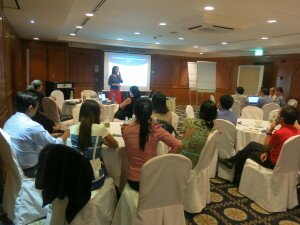Sexual and Reproductive Health of Persons with Disabilities in Cambodia
“We have the right to love but we do not dare to love”. This statement of a group of Cambodian women with disabilities illustrates that men and women with disabilities do not only face a number of barriers to marriage, they also fear rejection because of their impairments. Thus, sexual and reproductive health, rights and needs of persons with disabilities are invisible. In order to overcome the information gap and identify and address challenges, an evidence base is required to inform the implementation of disability inclusive sexual and reproductive health programmes.
Sexual and Reproductive Health of Persons with Disabilities in Cambodia
“We have the right to love but we do not dare to love”. This statement of a group of Cambodian women with disabilities illustrates that men and women with disabilities do not only face a number of barriers to marriage, they also fear rejection because of their impairments. Thus, sexual and reproductive health, rights and needs of persons with disabilities are invisible. In order to overcome the information gap and identify and address challenges, an evidence base is required to inform the implementation of disability inclusive sexual and reproductive health programmes.
On Thursday the 12th of May 2016, Dr Alexandra Gartrell, Research Fellow from the Monash University in Melbourne, presented two studies in a workshop in Phnom Penh to representatives from organisations such as WHO, UNICEF, Reproductive Health Alliance Cambodia, Partnering to Save Lives Cambodia, Epic Arts and GIZ. Dr Gartrell’s research on disability and sexual and reproductive health and rights is the first study to specifically examine disability, sexual and reproductive health in Cambodia, and was conducted in four provinces; Kampot, Kep, Kampong Thom and Kampong Speu. Such research is vital as the sexual and reproductive health and rights of persons with disabilities have been deeply neglected in a historical pattern that includes denied information about sexual and reproductive health, denied rights to establish relationships, and the right to decide whether, when and with whom to have a family.
Dr Gartrell presented two studies, both jointly conducted with the Cambodian Disabled People’s Organisation and supported by the GIZ Maternal and Newborn Care project. The first is a qualitative study which explored key challenges persons with disabilities face in accessing sexual and reproductive health services. Dr Gartrell found that disability shapes women and men with disabilities’ sexual and reproductive lives, and that for rural women in Cambodia, disability fundamentally reduces women’s potential to marry, bear children and acquire the socio-economic security of marriage. Additionally, women face challenges in the culturally-based stigma that exposes women with disabilities to greater rates of physical, verbal and sexual abuse than their able-bodied counterparts.
Dr Gartrell also found that persons with disabilities’ knowledge of contraception and reproduction is limited, affected by the overall low levels of education among people with disabilities, the poor quality of education in Cambodia generally, and marital status. Dr Gartrell emphasized to the audience that the provision of appropriate, practical and emotional support by health professionals, teachers, families and community members need to be promoted to overcome these barriers.
Based on the foundational insights of this qualitative study, the second study Dr Gartrell presented is a quantitative one defining baseline values to inform GIZ Muskoka project targets. Dr Gartrell found that the sexual and reproductive lives of persons with disabilities differ in terms of their knowledge, practices, and access to information and services, and that these differences are significantly influenced by gender, impairment type, and education level. As for knowledge of sexual and reproductive health, Dr Gartrell reports that age, education and socio-economic status and membership to self-help groups influence this. Yet greater knowledge of sexual and reproductive health does not result in respective behaviour and is not sufficient to increase access to health services.
Dr Gartrell recommends involvement of family members to increase health service utilisation. Supportive parents and spouses are critical facilitators of persons with disabilities access to health services. Advocacy to promote recognition among these key supporters that persons with disabilities have the same reproductive health needs is required.
An active workshop discussion centered on women’s view on contraception, how to provide reproductive health information to persons with disabilities in an accessible manner, and the possible role self-help groups and other organisations of persons with disabilities can play in this area. Attendees of the event discussed the need for linking initiatives on reproductive health communication and disability rights awareness.


